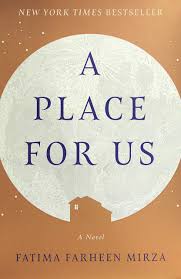The John Leonard Prize, our annual award based on member nominations and chosen by a panel of member volunteers, is awarded for the best first book in any genre. In advance of the announcement, we're inviting members to contribute appreciations of titles under consideration. (If you're interested in doing so, please email nbcccritics@gmail.com with the subject line Leonard.) Below, NBCC board member Marion Winik writes on Fatima Farheen Mirza's “A Place for Us” (Hogarth). This piece originally appeared on the website of Baltimore NPR station, wypr.org, where she recommends two books a week.
 In “A Place For Us,” by Fatima Farheen Mirza, an American Muslim family is torn apart in the struggle between tradition and modernity. “The wedding was coming together wonderfully. People were arriving on time. There was a table for mango juice and pineapple juice and another for appetizers, replenished as soon as the items were lifted from the platter. White orchids spilled from tall glass vases on every table.” But down the hall at the hotel bar, there is an element of this wedding that is not coming together so smoothly—the prodigal brother of the bride. Amar ran away from home years earlier after a series of escalating troubles in high school, rooted in a forbidden romance between him and Amira Ali, the daughter of a prominent local family. The novel moves back and forth in time to explore the story of parents Layla and Rafiq and their three children, Hadia, Huda, and Amar. The events of 9/11, the temptations of drugs and alcohol, the pressure for academic achievement, and the traditions of arranged marriage all play a role. The debut of 26-year-old Mirza is the first book from Sarah Jessica Parker's imprint at Hogarth and reflects very well on SJP's literary taste. Its title echoes a song from West Side Story, itself a retelling of Romeo and Juliet. Here the warring forces are not two families but one, split by the tension between reverence and rebellion. The great Ron Charles, book reviewer for the Washington Post, called the novel “absolutely gorgeous.” ” In prose of quiet beauty and measured restraint, Mirza traces those twined strands of yearning and sorrow that faith involves.”
In “A Place For Us,” by Fatima Farheen Mirza, an American Muslim family is torn apart in the struggle between tradition and modernity. “The wedding was coming together wonderfully. People were arriving on time. There was a table for mango juice and pineapple juice and another for appetizers, replenished as soon as the items were lifted from the platter. White orchids spilled from tall glass vases on every table.” But down the hall at the hotel bar, there is an element of this wedding that is not coming together so smoothly—the prodigal brother of the bride. Amar ran away from home years earlier after a series of escalating troubles in high school, rooted in a forbidden romance between him and Amira Ali, the daughter of a prominent local family. The novel moves back and forth in time to explore the story of parents Layla and Rafiq and their three children, Hadia, Huda, and Amar. The events of 9/11, the temptations of drugs and alcohol, the pressure for academic achievement, and the traditions of arranged marriage all play a role. The debut of 26-year-old Mirza is the first book from Sarah Jessica Parker's imprint at Hogarth and reflects very well on SJP's literary taste. Its title echoes a song from West Side Story, itself a retelling of Romeo and Juliet. Here the warring forces are not two families but one, split by the tension between reverence and rebellion. The great Ron Charles, book reviewer for the Washington Post, called the novel “absolutely gorgeous.” ” In prose of quiet beauty and measured restraint, Mirza traces those twined strands of yearning and sorrow that faith involves.”

